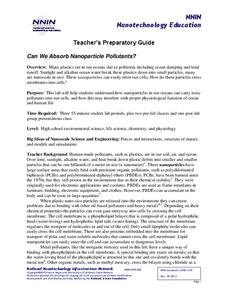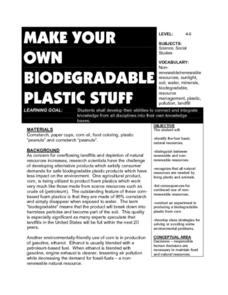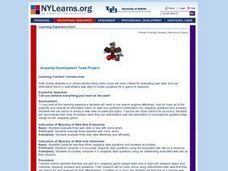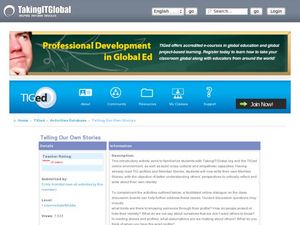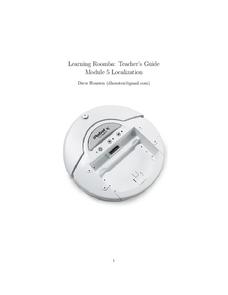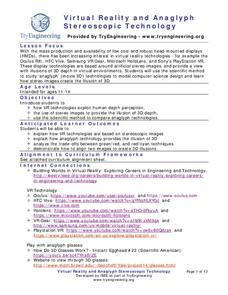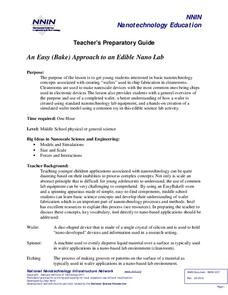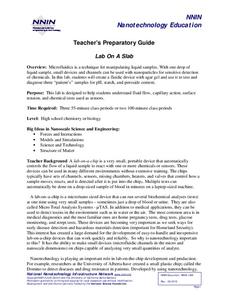Discovery Education
Fuss About Dust
Dust is everywhere around us; it's unavoidable. But what exactly is dust and are certain locations dustier than others? These are the questions students try to answer in an interesting scientific investigation. Working independently or...
Curated OER
Temperature and Thermal Energy
Examine how heat can be transferred between systems by reconstructing a diagram on energy flow and solving problems on heat flow and work done.
Curated OER
Reading Comprehension 6: Level 9
Did you know that an acre of trees can absorb as much carbon dioxide as a car emits in 11,000 miles of driving? Such fun facts abound in a short reading comprehension passage detailing the benefits of parks and rooftop gardens. After...
Curated OER
Intelligence in the Internet Age
Does technology affect our intelligence? Stefanie Olsen's article, "Intelligence in the Internet Age," and the thought provoking reading comprehension questions that follow, are sure to generate a lively discussion.
National Nanotechnology Infrastructure Network
Can We Absorb Nanoparticle Pollutants?
Just because we can't see it doesn't mean it isn't there! A growing concern for environmental scientists is toxic nanoparticles in our air and water. Young scholars conduct an experiment to demonstrate how these particles can cross our...
Curated OER
Make a Mission
Students discuss the terms exploration and technology. They read about the MESSENGER, Mission to Mercury, and answer questions. Next, they design and plan the technology for a space mission using an online interactive activity.
Curated OER
Make Your Own Biodegradable Plastic Stuff
Students identify the four basic natural resources. They distinguish bettween renewable and non-renewable resources. Pupils recognize that all natural resources are needed by living plants and animals. Students list consequences for...
Curated OER
Jeopardy Development Team Project
Students study the criteria for evaluating web sites and use information found in authoritative web sites to create questions for a game of Jeopardy. They evaluate three different web sites, some with minor errors and some with major...
Curated OER
Inventions in Everyday Life
High schoolers identify and solve problems as they modify the design of an everyday household item. They gather and analyze information and work in collaborative teams to create a design plan for a new product.
Curated OER
Aerogel
Students identify how technology aids scientists in their research. Through discussion, they explain the various ways scientists use Aerogel to aid in their collection of high-speed particles. Through experimentation, students create...
Curated OER
Telling Our Own Stories
Explore online profiles and social media with your middle and high school classes. Use blogs to inspire your class to craft a well-written, thoughtful response to a prompt you give. A few example prompts are given.
Oklahoma State Department of Education
Narrative Prompt
Reading about history is nothing like experiencing it firsthand. Encourage your eighth graders to do the next best thing with a historical narrative prompt, in which they describe the experience of a first-time traveler on the...
Drexel University
Learning Roomba Module 5: Localization
Where is my robot? Pupils create programs that utilize the localization services that a Roomba uses to determine its surroundings.
Institute of Electrical and Electronics Engineers
Virtual Reality and Anaglyph Stereoscopic Technology
Experiment with 3-D glasses to learn about stereo images and virtual reality. Scholars look at various images to determine if green/red or red/cyan glasses are preferable. They determine distances between images using the 3-D glasses and...
Chicago Botanic Garden
Calculating Your Ecological Footprint
You can lower your ecological footprint by recycling! Lesson four in this series of five has individuals, through the use of a computer, calculate their ecological footprints. Through discussions and analysis they determine how many...
Howard Hughes Medical Institute
Natural Selection and the Evolution of Darwin's Finches
Darwin explained the connection between species of finches 150 years before scientists understood DNA. Technology and progressing science proved he was right, yet many struggle to understand how natural selection happens. Scholars use...
National Nanotechnology Infrastructure Network
An Easy (Bake) Approach to an Edible NanoLab
You can make it if you bake it! Young scientists model electronic chip fabrication with an easy bake oven. They create a design to embed in their brownie "chips" and compare their models to wafer production in basic nanotechnology.
National Nanotechnology Infrastructure Network
Lab On A Slab
Capillary action is the frugal chemist's dream ... the less liquid used, the more tests they can run! Learners experiment with the best design to maximize the benefits of capillary action. Using a liquid sample, they design a capillary...
Kenan Fellows
Terrarium in a Bottle: Modeling the Atmosphere, Greenhouse Effect, and Water Cycle
You've heard of farm to table ... but what about farm in classroom? Junior agriculturalists embark upon a two-week journey into the science of growing things. Based upon the classic terrarium in a two-liter experiment, the instructional...
Brigham Young University
Understanding the Research Process
The second lesson in a unit on set design focuses on the importance of historical and stylistic research. Working in teams created in the previous session, groups consider what resources they will use as they consider design concepts for...
EngageNY
TASC Transition Curriculum: Workshop 15
What do a cheetah, Audi commercial, and air have in common? They're all topics of an engaging inquiry-based, hands-on workshop for educators about background knowledge, reading strategies, the CER model, and argumentative writing. The...
Workforce Solutions
Egg-streme Sports
Here's a new twist in the egg drop competition. Using only six inches of tape, four straws, and 2 pieces of newspaper, teams build a structure that keeps an egg from breaking when dropped. What's different about this project is that the...
Teach Engineering
Breathing Cells
Pairs work together to determine whether unknown solutions are either acids or bases by using a red cabbage indicator solution. After determining the general pH of the unknown solution, classmates blow into the same indicator after...
Curated OER
Go With the Energy Flow
Students explore energy and nutrient flow. In this science lesson, students diagram the flow of energy through food chains and food webs. Students discuss the importance of energy flow in Earth's ecosystems.






